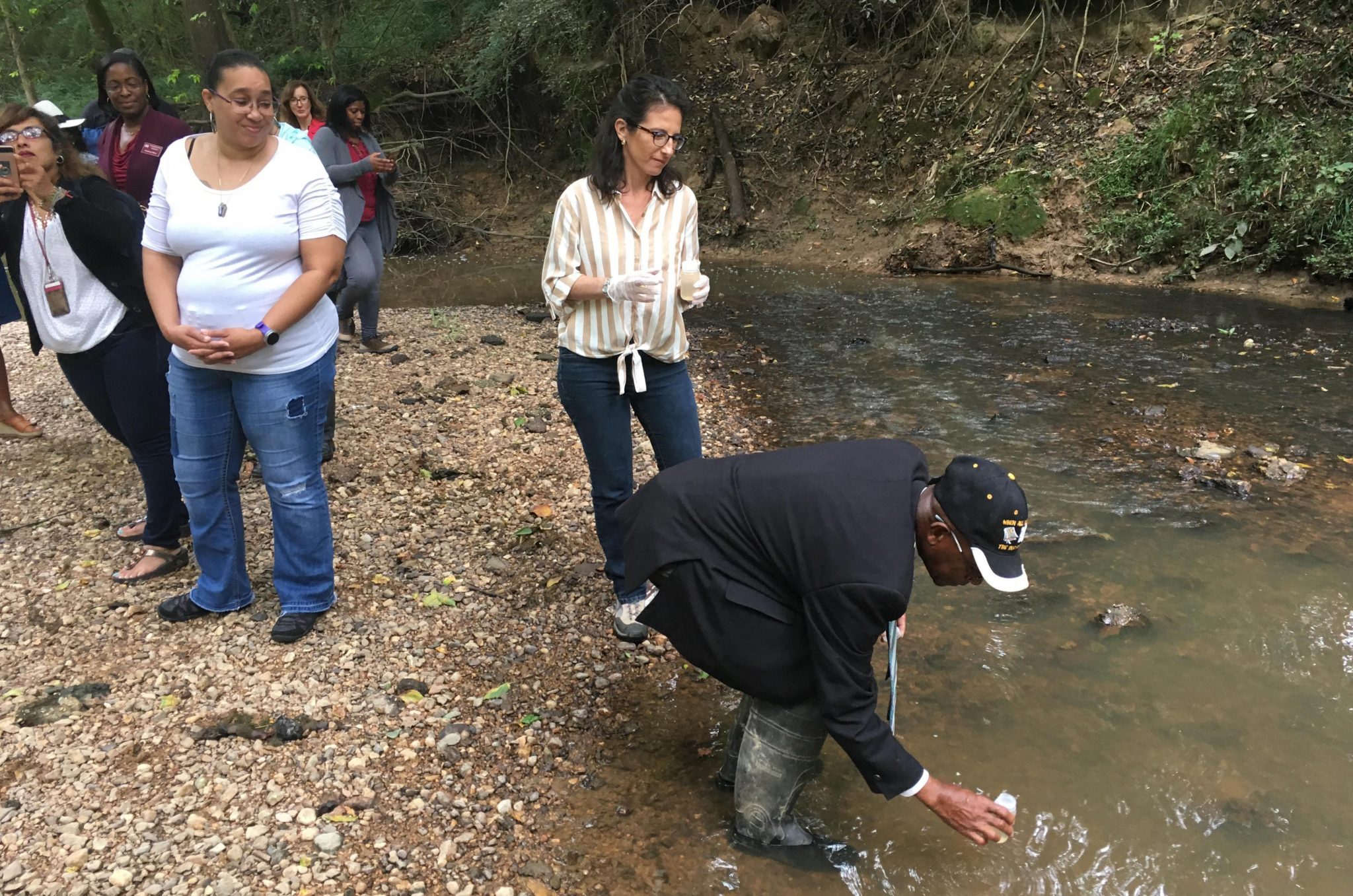
Members of a research team collect water samples in Jackson, where the University of Mississippi’s Community Wellbeing Flagship Constellation is funding a grant to explore the link between water quality and health. Photo by Kristie Willett/UM School of Pharmacy
OXFORD, Miss. – Less than a year since its launch, the University of Mississippi‘s Flagship Constellations initiative is already benefiting Mississippi, with four seed grants recently awarded to research teams within the Community Wellbeing constellation.
The grants, which total $17,200, fund a range of research that affects Mississippi, from uncovering the link between water quality and health in Jackson to identifying key barriers to political empowerment and participation in the state. The research teams consist of faculty, staff and students from UM Oxford and the University of Mississippi Medical Center.
The Flagship Constellations initiative was unveiled in November 2017 as a collaborative effort among faculty, staff and students to explore and solve complex issues through the diversity of ideas. The initiative includes multidisciplinary teams working to find solutions to grand challenges in the areas of big data, brain wellness, community wellbeing and disaster resilience.
With communities representing both rural and urban settings facing increasing challenges in areas such as personal health and housing and infrastructure, the Community Wellbeing constellation’s research teams and programs work within communities to identify factors impairing their well-being and deploy new programs and practices to build stronger, more vibrant communities.
“Grand challenges will require new and innovative partnerships,” said John Green, constellation team leader, professor of sociology and director of the UM Center for Population Studies. “In that spirit, for the seed grants, we required that applicants include investigators from at least two different departments to be eligible, and we strongly encouraged collaboration linking UM with UMMC.
“Applications were also scored based on their contributions to scholarship and to addressing needs in Mississippi communities.”
Fourteen different units at UM and UMMC are represented among the four awardees. The grants are supported by a $1 million donation to the Flagship Constellations by Thomas and Jim Duff, who created the Ernest R. Duff Flagship Constellation Fund in honor of their father.
“The Flagship Constellations is a significant initiative at the university that seeks to tie together broad expertise that exists at UM around grand-challenge issues facing society,” said Josh Gladden, vice chancellor for research and sponsored programs at UM.
“Such challenges are inherently multidimensional, and comprehensive research universities are uniquely suited to address them. We are so thankful to the Duff family whose gift was critical for getting this important initiative off the ground and enabling UM researchers to develop practical solutions in these areas.”
The awardees are:
- Community Political Empowerment Assessment Project: This project uses fuzzy cognitive mapping and community focus groups to identify the key barriers to political empowerment and participation, as well as identifying resources for overcoming those barriers. This information will be used to work with local stakeholders to hold informational sessions around barriers and develop a voter empowerment brief to inform local, state and national leadership on issues being faced by these rural, marginalized communities.
- Helping Communities Uncover the Link between Water Quality and Health in Jackson, Mississippi: This award supports the efforts of the Jackson Water Coalition to improve water quality and infrastructure in Jackson. The project team is working on an information briefing for the coalition that provides an overview of the connections between water quality and health and infrastructure challenges. The team also is partnering with the coalition and other stakeholders to organize a series of drinking water and water body sampling events.
- Learning about HIV Risk and Resilience among African-American Adolescents through Storytelling: This project is identifying barriers and inroads to HIV prevention among African-American adolescents. An interdisciplinary health communication class in spring 2019, created through the university’s new M Partner program, will assist the team in facilitating expressive writing, creative role play and a series of peer-led focus groups in Charleston. Findings will inform an AIDS prevention agenda for the Mississippi Delta, including a culturally sensitive information campaign and behavioral intervention opportunities within the faith community.
- Student-Centered Outcomes Research Experience, or SCORE – Pilot: Project SCORE is engaging Mississippi high school students from communities with significant health disparities in the development of relevant health behavior research questions by partnering with graduate students in the health sciences to train them in basic research methodology. The project is aiding the development of student-conducted research projects to explore student-driven research questions related to health behavior and develop a student-centered prevention and wellness research agenda to address student-identified needs.
“We were looking for proposals that were scientifically sound, demonstrated a broad collaborative team membership, (encouraged) engagement from nonuniversity partners and that could be leveraged into larger project proposals in the future,” said Meagen Rosenthal, constellation team leader and assistant professor of pharmacy administration.
Besides Green and Rosenthal, other Community Wellbeing team leaders are Seena Haines, professor and chair of the Department of Pharmacy Practice; and Dr. Joshua Mann, professor and chair of UMMC’s Department of Preventive Medicine.
The constellation team leaders recently announced a second call for seed-funding proposals for fall 2018, with roughly $20,000 available for awards. These awards will be selected in early 2019.
For additional information, visit http://flagshipconstellations.olemiss.edu/community-wellbeing/.